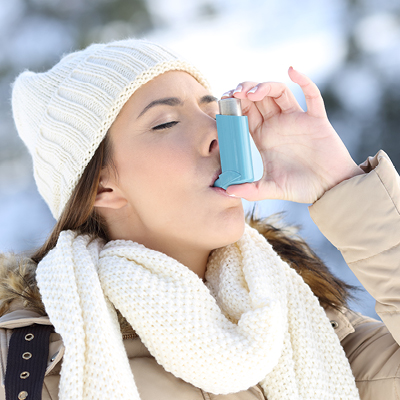'Tis the season to avoid asthma triggers
Posted November 17, 2021 by Brian Bauman, MD

Updated November 2024
You know winter has arrived when the days get shorter, snow flurries fill the air and you can see your breath when you speak. When temperatures hover around freezing for months on end, it can make for a long and dreary season for many.
But for people with asthma, it can be even more frightful when the frigid winter weather causes their symptoms to worsen. Exposure to cold, dry air is a common asthma trigger and can quickly cause severe symptoms.
When cold, dry air enters the lungs, it causes the airways to contract, which makes it difficult to breathe and is dangerous for asthma sufferers.
That’s why when you step outside to shovel snow or have a snowball fight with your kids, you might experience coughing, wheezing, shortness of breath and chest tightness.
In addition, harsh winter weather forces us indoors, where indoor allergens can cause problems. Not to mention, colds and the flu are more prevalent during winter months and can trigger or worsen asthma attacks.
But since we can’t stay cooped up inside all winter long, Summa Health clears the air on ways to better control your asthma when temperatures dip. Controlling your asthma in these frigid months may take a little more effort, but it’s totally worth it to breathe easier this winter.
- Wash your hands frequently to avoid infections. Washing your hands often with soap and water can help prevent catching colds or the flu this winter. If a sink is not available, alcohol-based hand sanitizers are the next best thing. The common cold and flu virus can lead to asthma flare-ups and compound asthma symptoms when stepping outside in the cold.
- Get vaccinated. The Centers for Disease Control and Prevention recommend an annual flu shot for people 6 months and older, a COVID-19 vaccine for those ages 5 and older, and an RSV vaccination for adults with asthma over the age of 60. This year’s flu shot may be more important than ever before because of the ongoing COVID-19 pandemic and risk of co-infection. If you do get the flu or COVID-19, the results could be more serious for people with asthma.
- Cover your nose and mouth with a scarf or facemask when heading outside. Also, be sure to breathe through your nose when you’re out in the cold. Both of these practices can help warm and humidify the air before it enters your lungs.
- Replace your home’s furnace filters often. Your home heating system can blow dust and debris throughout your house, which can trigger an asthma attack. Clean and check filters periodically throughout the winter season to avoid problems.
- Limit nights by the fire. Although sitting by the fire is appealing on frigid days, pollutions from burning wood and smoke can irritate your airways and trigger asthma symptoms.
- Exercise indoors during the coldest months. On very frigid days, limit your outdoor activities. If you must head outside to exercise, warm up indoors first. Studies show people with asthma recover faster and have greater lung function after exercising when they are warmed up.
- Prevent asthma flare-ups in the first place. Take all preventative (‘maintenance’) doses of your asthma medicine every day as prescribed, even if you are feeling well. Before heading outside, make sure you always have quick-relief medicine on hand and depending on your individual action plan it may be beneficial to take before activities that are prone to trigger difficulty breathing, such as outdoor activities in the cold. In addition, make sure you’re getting regular checkups and update yourself on your asthma action plan. You need to know what to do in case of an asthma attack.
If you suspect the cold weather is playing a role in your asthma flare-ups, keep a diary of symptoms to discuss with your doctor. Then, update your asthma action plan with weather triggers and ways to manage them, including any seasonal increases in medication.
To schedule an appointment with your doctor , call 330.319.9700.
About the Author
Vitality eNews Sign Up
Receive the Summa Health eNewsletter for the latest health tips, advice and updates.


 Listen to this episode of the Healthy Vitals Podcast featuring
Listen to this episode of the Healthy Vitals Podcast featuring